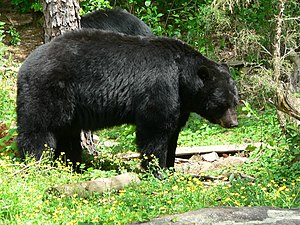Korean/Words/곰
Appearance
| This is a primary, secondary and/or original Eurasiatic research project at Wikiversity. |
| |
곰
[edit | edit source]



- 포유강 식육목 곰과의 동물을 통틀어 이르는 말. 몸이 비대하며 다리가 굵고 짧다. 꼬리는 털에 가려져 보일 듯 말 듯 하다. 털은 갈색, 검은색 따위가 있으며 길고 거칠다. 깊은 산이나 북극 지방에 살며 나무에 잘 오르고 잡식성으로 대부분 겨울에는 굴속에서 겨울잠을 잔다. 대부분 북반구에 분포한다.
- Hyponyms
- 불곰 (bul-, "brown bear" lit. "fire bear") cf. w: Bear #Etymology [3]
- 흰곰 (huin-, "polar bear" lit. "white bear")
- Comparatives
- Korean vs. Japanese
|
- Korean vs. Germanic
- English groom
- Etymology
- 1604, short for bridegroom (“husband-to-be”), from Middle English brydgrome, alteration (with intrusive r) of earlier bridegome (“bridegroom”), from Old English brȳdguma (“bridegroom”), from brȳd (“bride”) + guma (“man, hero”). ...
- Old English guma
- (poetic) man, hero
- Synonyms: beorn #Old English
- Old English beorn
- (poetic) man, warrior
- Synonyms: guma #Old English
- Etymology
- The origin is disputed. A phonetically exact correspondence exists in Old Norse bjǫrn (“bear”), ...
- As such:
- English groom
|
- ↑ https://ko.dict.naver.com/#/search?query=곰
- ↑ https://en.wiktionary.org/wiki/곰
- ↑ English bear may be cognate with fire or pyre rather than brown.
- ↑ cf. Japanese 熊 (クマ, kuma, "bear")
- ↑ cf. Etymology: A phonetically exact correspondence exists in Old Norse bjǫrn (“bear”).
